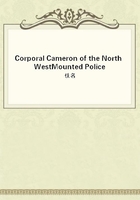
第27章
That experiment proved the climax." At the memory of that experience Martin laughed loud and long. "It was funny! Mr. Rae, the cool, dignified, methodical, exact man of the law, struggling to lick into shape this haughty Highland chieftain, who in his heart scorned the whole silly business. The result, the complete disorganisation of Mr. Rae's business, and total demoralisation of Mr. Rae's office staff, who one and all swore allegiance to the young chief. Finally, when Mr. Rae had reached the depths of desperation, Cameron graciously deigned to inform his boss that he found the office and its claims quite insupportable."
"Oh, it must have been funny. What happened?"
"What happened? You bet old Rae fell on his neck with tears of joy, and sent him off with a handsome honorarium, as your gentle speech has it. That was a fortnight ago. Then Dunn, in despair, took Cameron off to his native haunts, and there he is to this day.
By the same token, this is the very afternoon that Dunn returns.
Let us go to meet him with cornets and cymbals! The unexpected pleasure of your return made me quite forget. But won't he revel in you, old boy!"
"I don't know about that," said Linklater gloomily. "I've a kind of feeling that I've dropped out of this combination."
"What?" Then Martin fell upon him.
But if Martin's attempts to relieve his friend of melancholy forebodings were not wholly successful, Dunn's shout of joy and his double-handed shake as he grappled Linklater to him, drove from that young man's heart the last lingering shade of doubt as to his standing with his friends.
On his way home Dunn dropped into Martin's diggings for a "crack," and for an hour the three friends reviewed the summer's happenings, each finding in the experience of the others as keen a joy as in his own.
Linklater's holiday had been the most fruitful in exciting incident. For two months he and his crew had dodged about among quaint Norwegian harbours and in and out of fjords of wonderful beauty. Storms they had weathered and calms they had endured; lazy days they had spent, swimming, fishing, loafing; and wild days in fighting gales and high-running seas that threatened to bury them and their crew beneath their white-topped mountainous peaks.
"I say, that must have been great," cried Dunn with enthusiastic delight in his friend's experiences.
"It sounds good, even in the telling," cried Martin, who had been listening with envious ears. "Now my experiences are quite other.
One word describes them, grind, grind, grind, day in and day out, in a gallant but futile attempt to justify the wisdom of my late examiners in granting me my Triple."
"Don't listen to him, Linklater," said Dunn. "I happen to know that he came through with banners flying and drums beating; and he has turned into no end of a surgeon. I've heard old Kingston on him."
"But what about you, Dunn?" asked Linklater, with a kind of curious uncertainty in his voice, as if dreading a tale of calamity.
"Oh, I've loafed about town a little, golfing a bit and slumming a bit for a chap that got ill, and in spare moments looking after Martin here."
"And the International?"
Dunn hesitated.
"Come on, old chap," said Martin, "take your medicine."
"Well," admitted Dunn, "I had to chuck it. But," he hastened to add, "Nesbitt has got the thing in fine shape, though of course lacking the two brilliant quarters of last year and the half--for Cameron's out of it--it's rather rough on Nesbitt."
"Oh, I say! It's rotten, it's really ghastly! How could you do it, Dunn?" said Linklater. "I could weep tears of blood."
To this Dunn made no reply. His disappointment was even yet too keen for him to treat it lightly. "Anything else seemed quite impossible," at length he said; "I had to chuck it."
"By the way," said Martin, "how's Cameron?"
Again Dunn paused. "I wish I could tell you. He's had hard luck this summer. He somehow can't get hold of himself. In fact, I'm quite worried about Cameron. I can't tell you chaps the whole story, but last spring he had a really bad jolt."
"Well, what's he going to do?" Martin asked, somewhat impatiently.
"I wish I knew," replied Dunn gloomily. "There seems nothing he can get here that's suitable. I'm afraid he will have to try the Colonies; Canada for preference."
"Oh, I say, Dunn," exclaimed Martin, "it can't really be as bad as all that?"
Dunn laughed. "I apologise, old chap. That was rather a bad break, wasn't it? But all the same, to a Scotchman, and especially to a Highlander, to leave home and friends and all that sort of thing, you know--"
"No, he doesn't know," cried Linklater. "The barbarian! How could he?"
"No, thank God," replied Martin fervently, "I don't know! To my mind any man that has a chance to go to Canada on a good job ought to call in his friends and neighbours to rejoice with him."
"But I say, that reminds me," said Dunn. "Mr. Rae is coming to have a talk with my governor and me about this very thing to-morrow night. I'd like awfully if you could drop in, Martin; and you, too, Linklater."
Linklater declined. "My folks have something on, I fear."
Martin hesitated, protesting that there was "altogether too much of this coddling business" in the matter of Cameron's future.
"Besides, my work is rather crowding me."
"Oh, my pious ancestors! Work!" exclaimed Linklater in disgust.
"At this season of the year! Come, Martin, this pose is unworthy of you."
"If you could, old man," said Dunn earnestly, "we won't keep you long. It would be a great help to us all."
"All right, I'll come," said Martin.
"There'll be no one there but Mr. Rae. We'll just have a smoke and a chat."